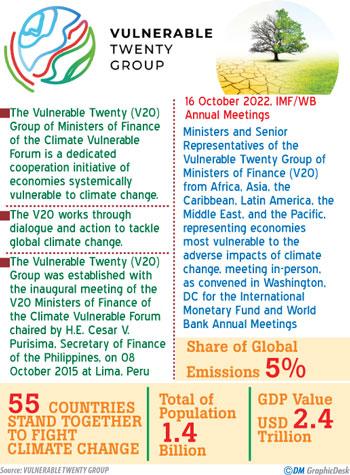Reply To:
Name - Reply Comment
 While in Washington for the IMF and World Bank meetings yesterday, State Minister Shehan Semasinghe participated at the ‘V-20 Ministerial Dialogue’ held during the WB annual meetings.
While in Washington for the IMF and World Bank meetings yesterday, State Minister Shehan Semasinghe participated at the ‘V-20 Ministerial Dialogue’ held during the WB annual meetings.
The state minister addressed the forum by thanking the organizers for inviting him to make a brief intervention at the forum and said that; “in the interest of time, I will focus on two aspects of vulnerability, namely climate vulnerability and financial vulnerability”.
He said that “climate change today is a global reality that has brought forth unprecedented changes to the environment, natural ecosystems, and biodiversity and significantly disrupted socio-economic processes across many economies”. “Sri Lanka also has been ranked among the countries that are most vulnerable to climate change in the global climate change risk index. The UN-IPCC Sixth Assessment Report shows that the intensified water cycles due to climate change are bringing more intense rainfall and associated flooding, changes in rainfall patterns and monsoon precipitation in many regions of the world. These impacts are increasingly becoming visible in Sri Lanka, with frequent damages and losses of lives, livelihoods and damages to the built environment, adding further pressure on already stressed fiscal balances. These enormous economic costs barely cover the significant and irreversible damage that would be done to ecosystems, social structures, and lives from extreme climate events”. “In the meantime, Sri Lanka has been facing its worst economic downturn since independence in 1948, as a result of the Covid-19 pandemic and other global challenges. The weakened fiscal and external sector positions required Sri Lanka to announce a debt standstill and commence discussions with the IMF and embark on structural adjustments to correct the direction of policies to stabilize the economy”.
“Sri Lanka is currently squeezed from multiple sides such as witnessing lasting effects of COVID, supply chain bottlenecks, capital outflows with interest rates in advanced economies, rocketing fuel and food prices and rising costs of inputs, such as fertilizer, that jeopardize future food production levels.”
“In addition, climate change itself is also raising the cost of capital of the country, which signals the inter-dependence of climate risks and financial risks. Due to high risk of debt distress, fiscal situation not only constrains the ability of governments to meet immediate development needs but also limits their ability to invest in longer-term challenges, such as climate change”.
The state minister concluded his address by saying that, “Many countries like Sri Lanka cannot address climate risks and financial risks on their own. While appreciating the recent initiatives, such as the IMF’s ‘Food Shock Window’ and ‘Resilience and Sustainability Trust’, we have to acknowledge that these are not sufficient. Therefore the gatherings as the one we are having today are important to understand the risks and challenges of these crises and to plan for the future towards sustainable economic development. Such groupings could also play a key role in encouraging multilateral and bilateral concessional financing and global technology transfers which are essential to find innovative solutions to address these vulnerabilities.”